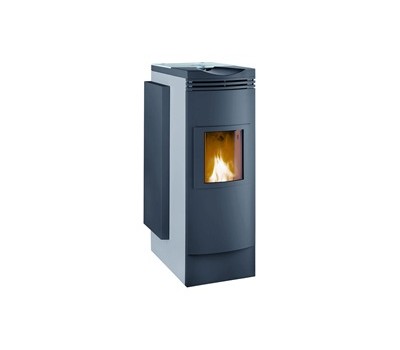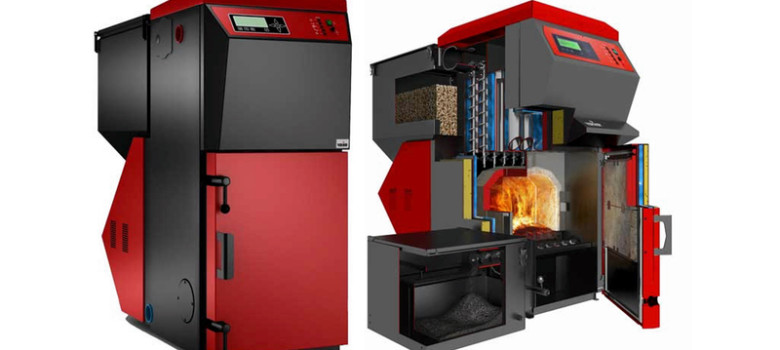
Comparing the cost of biomass boilers with conventional boilers
Biomass boilers start at about £7,000 for a 12kW domestic version, which is sufficient to provide heat and hot water for a 4-bed house. A comparably sized gas boiler will only cost around £2500 to install. A bigger biomass boiler with an auto-feed hopper may cost closer to £12,000.
However, biomass boilers burn biomass fuel, which is considered renewable. Therefore, provided that the boiler is MCS-accredited, you will be eligible for the Renewable Heat Incentive that will pay you for every kilowatt-hour of heat produced.
In terms of the cost of fuel, the average price of wood pellets are around 4.2p/kWh which is very much in line with mains gas, while oil costs a little more at 6p/kWh. However, the price of wood pellets is likely to become more attractive going forward since gas prices have continued to rise in recent years, and this trend looks to continue. Biomass boilers are completely independent of the fluctuating import prices of foreign fuels such as gas and oil.
Also, if you are lucky enough to have a free supply of wood, then you can heat your home at zero cost.
Comparing the efficiency of biomass boilers with conventional boilers
Biomass boilers run at an efficiency of 89 – 91% (Trianco Greenflame – 91%; Angus Orlingo 500 – 92%), while the top-rated gas boilers similarly run between 88 – 91% efficiency (Baxi Duo-tec HEA 91%; Valiant Ecotec Plus series over 91%); therefore biomass boilers are comparable to conventional gas boilers.
Comparing biomass boiler maintenance with conventional boilers
If you decide to opt for a biomass boiler, you will have to feed it fuel from time to time. For example the Baxi Bioflo will need to be refuelled every 3 -4 days. Bigger biomass boilers with auto-feed hoppers will only need to be refuelled every couple of weeks. In addition, ash builds up as part of the combustion process (wood combustion produces about 0.5% – 1.5% by weight of ash) which will need to be emptied too.
A gas boiler is very much an ‘install and forget’ technology, so it is the clear winner here.
Comparing the size of biomass with conventional boilers
Biomass boilers are much bigger than conventional boilers, since they will have to have some element of an auto-feed option. In the case of the Baxi Bioflo, it is 1.2m high, while a conventional gas boiler is half the size.
The other thing is that gas tends to come from the mains gas supply via a gas pipe. A biomass boiler will need to be situated relatively close to a fuel supply, which obviously means you are going to need a decent-sized storage facility that can be kept dry and contained so there is no fire risk.
Comparing the environmental credentials of biomass boilers and conventional boilers
Biomass boilers run on biomass fuel. Biomass fuel tends to be derived from quick-growing trees and fuel grasses. Trees absorb carbon dioxide as part of photosynthesis, which is the process that allows them to produce sugars required for growth. When the trees are felled and then burnt, they release the same level of carbon dioxide that they took in, meaning that biomass is arguably a carbon-neutral fuel.
It can be argued that gas is also derived from the breakdown of vegetation, but this process takes millions of years, and we are currently using the gas at such a rate that we are getting through our supplies much quicker than it is being replenished; it is therefore not sustainable. As a result gas and other fossil fuels are not considered to be renewable, since the time scale for the process to occur is simply too long.
As a result, burning biomass is not considered particularly harmful to the environment, whereas burning gas is considered to have negative consequences.
The other thing to bear in mind is that growing crops for fuel is only okay if the land that the crops are being grown on has not historically been used to grow food. Growing fuel crops at the expense of food crops is obviously an unsustainable practise.
The final verdict – biomass versus conventional boilers
MCS-approved pellet fired or gasification biomass boilers are comparable with the most efficient conventional gas boilers and, through the Renewable Heat Incentive, they actually produce a very healthy return (provided the heat demand on your EPC is sufficient). Therefore provided you have the space to house the fuel and the boiler itself and you are happy that you are going to have to ‘feed and clean’ the boiler on a regular basis, then a biomass boiler is certainly worth considering.
Obviously they are very expensive to buy upfront, so this too is something you have to bear in mind. If you have access to cheap finance then installing a biomass boiler could actually be a no-brainer!
Benefits
- Biomass boilers are more efficient than conventional gas boilers
- Since they use renewable fuel, the benefit from the Renewable Heat Incentive
Limitations
- Biomass boilers require maintenance – they need to be feed fuel and cleared of ash on a regular basis.
- They require a greater amount of room since the units are not only bigger, you also need to store the fuel somewhere close to the boiler.
Cost
- A biomass boiler might cost £7000, while a gas boiler might cost just £2500.
Installing a biomass boiler?
Are you thinking about installing a biomass boiler? We have scoured the country for the best tradespeople, so that we can make sure we only recommend those we really trust.
If you would like us to find you a local installer, just fill in the form below and we will be in touch shortly!













I live in London and quite want to install a biomass since I could get the RHI. Is burning the pellets acceptable or does it go against the clean air act?
Hi Djmlead, unfortunately for urbanised London the biomass boiler option may not be the best idea. Have you heard of the air source heat pump? So, like the biomass boiler you can still earn from the RHI, but the technology can easily be installed on most homes around London. Have a look at this article for more information: http://www.thegreenage.co.uk/tech/air-source-heat-pumps/
Obviously let us know if you have further questions.
One thing I havent seen mentioned here is the cost of the annual service of your biomass boiler. We had one installed 2 years ago for our 4 bed house, taking advantage of the grants then available. We beleived that with the lower cost of fuel we would recoup the additional cost within 5-7 years. That was before we got our first annual service bill. At nearly £400 this almost eliminates the difference in fuel costs. To say we’re disappointed is an understaement. yes, we should have checked before but neither do we recall seeing this in any of the literature.
Biomass boilers have been oversold in many respects. I installed a system a year ago at a cost of over £100k. It has underperformed from an efficiency and RHI return point of view. The boiler is very unreliable -not working 1 out of every ten days, over the course of the year. Obtaining repairs and maintenance is frustratingly difficult, servicing costs extortionate , fuel deliveries unreliable. Trying to do things right, I went for a high end system – I should not have bothered. There is going to be a major backlash against this industry in the coming years as more and more dissatisfied customers emerge from the Biomass hype. Thinking of buying a Biomass system… save yourself stress, hassle, frustration and a lot of money – don’t.
Well blame yourself for spending £100k on a bio boiler. Silly. Then blaming renewable energy for your naivety. Ignore this troll.
What boiler did you go for?
I have a hargassner 42 kW biomass boiler (no buffer tank required) installed in October 2014, and has been very reliable install cost was £27000 including all labour and fuel storage the rhi is paying £9.5k per year for 7 years, the estimated fuel usage figures are way out but it still pays for its self and a healthy surplus. the only problem i have had is that the pellet delivery pipe blocks from time to time but I have a beacon fitted to alert me of any faults.
I would recommend biomass boilers but only in large old buildings running on heating oil
Eco Angus are one of the worst boilers available, very poor build quality, very poor design, you would be very lucky to get 5 years out of the appliance, the boiler leaks out carbon monoxide as the boiler is pressurised with the fans being in front of the boilers instead of being on the output side making it far safer…. avoid…. spend slightly more and get quality.
Dear Greenage
I have an excellent ETA biomass boiler (https://www.eta.co.at/en/) and use Woodlets ENplusA1 pellets (https://www.woodlets.co.uk/).
Having read concerns about micro-particulate pollution from wood burning stoves, for example I read in today’s Guardian that “40% of particles in British cities are from wood burning” (citation – Prof Gary Fuller at King’s College, London), I am left wondering if my biomass boiler is as green as it is cracked up to be. The firm who installed the boiler are excellent and I have it maintained as recommended by the manufactures. They have assured me that it meets all European regulations, and the Environmental Health Officer at our local county council (Northumberland) has likewise reassured me that it will be meeting all current standards. I have tried to borrow, hire or even purchase equipment to measure micro-particulates, but have not had any joy.
I would greatly appreciate your advice on whether you think there could be an issue with micro-particulates and my boiler, and with biomass boilers in general.
Many thanks in advance for your help.
Best wishes, Herbie
Hello, We are converting some industrial buildings approx size 5,000sq ft each and looking for 2 biomass boilers and some asdvice to heat these building the most efficient way.
This article should have a date on it, I’m researching Biomass Boilers at the moment ( April 2022) Wood pellet prices have increased by circa 40%, Gas Boiler efficiencies are at 98% – as much as i’d like Biomass to make sense for me, it simply isn’t stacking up, even with a £5k sweetener from Government